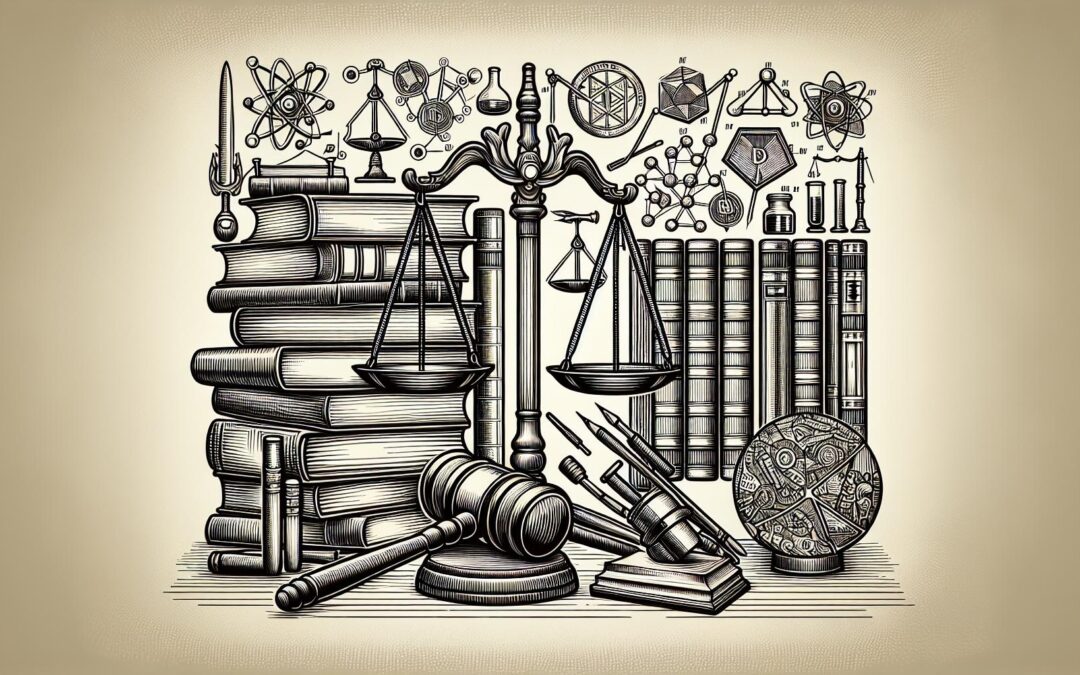The General Services Administration (GSA) is an independent agency of the United States government that plays a vital role in managing and supporting the basic functioning of federal agencies. It provides various services, including procurement, facilities management, and technology solutions, to ensure efficient and effective government operations.
One important aspect of GSA’s responsibilities is its involvement in intellectual property (IP). Intellectual property refers to creations of the mind, such as inventions, designs, and artistic works, that are protected by legal rights. Understanding how GSA navigates the complex world of intellectual property is crucial for anyone involved in government contracts or working with federal agencies.
Understanding the General Services Administration (GSA)
Before delving into GSA’s relationship with intellectual property, it’s essential to grasp the overall function and significance of this agency. GSA serves as the centralized procurement arm for the federal government, allowing agencies to access and obtain the resources necessary for their operations.
The General Services Administration (GSA) is an independent agency of the United States government, established in 1949 to streamline the administrative work of the federal government. It is responsible for managing and supporting the basic functioning of federal agencies, ensuring that they have the tools and resources needed to carry out their missions effectively.
GSA’s primary role is to support federal agencies in fulfilling their missions by providing them with access to a wide range of products and services. It leverages the government’s purchasing power to negotiate favorable contracts with vendors, ensuring that agencies can acquire goods and services at the best possible value.
One of the key functions of GSA is procurement. It oversees the acquisition process for federal agencies, ensuring that they have access to the goods and services they need to carry out their operations. GSA’s procurement experts work closely with agencies to identify their requirements, develop solicitations, evaluate proposals, and award contracts.
In addition to procurement, GSA also oversees various other functions, including managing federal buildings, leasing workspace to agencies, and developing and implementing technology solutions to improve government operations. GSA manages more than 370 million square feet of office space and provides workspace for over 1.1 million federal employees.
The Role and Function of GSA
GSA’s role as the centralized procurement arm of the federal government is crucial in ensuring that agencies have access to the resources they need to fulfill their missions. By leveraging the government’s purchasing power, GSA is able to negotiate favorable contracts with vendors, resulting in cost savings for the government and ensuring that agencies can acquire goods and services efficiently.
Moreover, GSA’s role extends beyond procurement. It is responsible for managing and maintaining federal buildings, ensuring that they are safe, secure, and functional. GSA’s Federal Buildings Program oversees the design, construction, renovation, and operation of federal buildings across the country, providing agencies with the physical infrastructure they need to carry out their work.
GSA also plays a critical role in developing and implementing technology solutions to improve government operations. It works with agencies to identify their technology needs, develop innovative solutions, and implement them effectively. GSA’s Office of Government-wide Policy is responsible for setting policies and standards for information technology, ensuring that federal agencies can leverage technology to enhance their efficiency and effectiveness.
GSA’s Involvement in Intellectual Property
While GSA’s involvement in intellectual property may not be immediately obvious, it plays a critical role in ensuring that government agencies comply with IP laws and regulations. GSA is responsible for administering contracts that involve the use or creation of intellectual property and for protecting the rights of both the government and the contractors involved.
GSA’s engagement with intellectual property encompasses several key areas, such as acquiring and licensing intellectual property, protecting the government’s interests in IP-related contracts, and providing guidance to federal agencies on IP policies and procedures.
When federal agencies need to acquire intellectual property, GSA assists in the process by negotiating licenses and agreements with IP owners. This ensures that agencies have the necessary rights and permissions to use the intellectual property, while also protecting the interests of the government and the IP owners.
GSA also plays a role in protecting the government’s interests in IP-related contracts. It ensures that contracts involving the use or creation of intellectual property include appropriate provisions to safeguard the government’s rights. This includes provisions related to ownership, licensing, and indemnification.
Furthermore, GSA provides guidance to federal agencies on IP policies and procedures. It helps agencies navigate the complex landscape of intellectual property, ensuring that they understand their rights and obligations. GSA’s Office of General Counsel provides legal advice and support to agencies on IP-related matters, helping them navigate the intricacies of IP law.
In conclusion, the General Services Administration (GSA) is a vital agency that plays a crucial role in supporting the operations of federal agencies. From procurement to managing federal buildings and overseeing technology solutions, GSA ensures that agencies have the resources they need to carry out their missions effectively. Additionally, GSA’s involvement in intellectual property ensures that government agencies comply with IP laws and regulations, protecting the rights of both the government and the contractors involved.
Intellectual Property: A Brief Overview
Intellectual property is a broad and complex field that encompasses various types of creations and their associated legal protections. Understanding the different forms of intellectual property is vital for individuals and businesses looking to safeguard their innovative ideas and creations.
When it comes to intellectual property, there is a wide range of possibilities. From inventions and discoveries to brands and logos, from creative works like literature and artwork to confidential business information, each type of intellectual property serves a distinct purpose and requires specific legal processes for protection.
Types of Intellectual Property
The most common types of intellectual property are patents, trademarks, copyrights, and trade secrets. Patents protect inventions or discoveries, granting the inventor exclusive rights to make, use, and sell their creation for a limited period of time. Trademarks safeguard brands and logos, ensuring that consumers can identify and distinguish products or services from different sources. Copyrights cover creative works like literature, music, films, and artwork, giving the creator exclusive rights to reproduce, distribute, and display their work. Trade secrets, on the other hand, guard confidential business information, such as manufacturing processes, formulas, and customer lists, which provide a competitive advantage.
Each form of intellectual property has its own set of rules and regulations governing its protection. For example, obtaining a patent requires a detailed application process, including a description of the invention and its novelty, while trademarks need to be registered with the appropriate government authority. Copyright protection, on the other hand, is automatic upon creation of the work, but registration can provide additional benefits, such as the ability to sue for infringement.
It’s essential for individuals and organizations to understand which forms of intellectual property they possess and how to best safeguard their rights. This could involve consulting with intellectual property attorneys, conducting searches to ensure the novelty of an invention, or implementing internal processes to protect trade secrets.
Importance of Intellectual Property in Business
Intellectual property plays a pivotal role in fostering innovation and driving economic growth. It encourages individuals and businesses to invest in research, development, and creativity by granting them exclusive rights and the ability to commercialize their creations.
For businesses, protecting their intellectual property is crucial for maintaining a competitive advantage. It allows them to prevent unauthorized use or infringement, ensuring that their innovative ideas and products remain unique in the marketplace. By safeguarding their intellectual property, businesses can also preserve the value of their intangible assets, which often contribute significantly to their overall worth.
Furthermore, protecting intellectual property can foster collaboration and partnerships. When businesses know that their innovative ideas are legally protected, they can confidently share them with potential partners, investors, or customers. This not only encourages collaboration but also drives economic growth by facilitating the transfer of knowledge and technology.
In conclusion, intellectual property is a multifaceted field that encompasses various types of creations and their legal protections. Understanding the different forms of intellectual property and their importance in business is crucial for individuals and organizations seeking to safeguard their innovative ideas, maintain a competitive advantage, and foster collaboration.
Intellectual Property Terminology: A Comprehensive Guide
To navigate the field of intellectual property successfully, it’s important to understand the terminology and concepts that underpin this area of law. Familiarizing yourself with key IP terms will enable you to better protect your rights and effectively communicate with others involved in intellectual property matters.
Common Intellectual Property Terms and Definitions
Intellectual property terminology can sometimes be confusing, but becoming familiar with common terms can help demystify this complex field. Some essential IP terms include “infringement,” which refers to the unauthorized use of another’s intellectual property, and “priority date,” which is the date that an individual or business can claim as their first filing date for a patent application.
Other crucial terms include “fair use,” which allows limited use of copyrighted material for specific purposes, and “licensing,” which grants permission to use someone else’s intellectual property in exchange for compensation.
Understanding Intellectual Property Rights
Intellectual property rights are the legal rights that protect an individual or organization’s creations. These rights grant exclusive control and the ability to monetize intellectual property, ensuring that creators can benefit from their innovations.
Understanding the scope and limitations of intellectual property rights is important for all those involved in IP-related activities. From artists and inventors to businesses and government agencies, knowing when and how to seek protection for intellectual property is vital to fostering innovation and creativity.
GSA and Intellectual Property: The Connection
Given its multifaceted role in government operations, it should come as no surprise that GSA has a significant connection to intellectual property. GSA is committed to ensuring that federal agencies meet their legal obligations regarding intellectual property, promoting proper management of IP assets and compliance with relevant laws and regulations.
How GSA Manages Intellectual Property
GSA has put in place policies and procedures to facilitate the proper management and utilization of intellectual property by government agencies. It oversees the acquisition and licensing of IP and works closely with agencies to ensure that they acquire the necessary usage rights and comply with any existing IP agreements.
GSA’s management of intellectual property extends beyond procurement. The agency also assists in resolving disputes related to intellectual property, ensuring that the rights of both the government and contractors are protected.
GSA’s Intellectual Property Policies and Regulations
GSA has established specific policies and regulations to govern intellectual property-related activities within the federal government. These guidelines ensure that agencies understand their responsibilities and obligations when dealing with intellectual property rights and contracting.
By providing comprehensive documentation and resources, GSA enables federal agencies to navigate the complex landscape of intellectual property efficiently and effectively. These policies promote transparency, accountability, and adherence to legal requirements, fostering a favorable environment for innovation and the protection of intellectual assets.
Case Studies: GSA’s Role in Intellectual Property Disputes
Over the years, GSA has accumulated valuable experience in resolving intellectual property disputes. By examining past cases, we can learn important lessons about how GSA approaches these conflicts and discover best practices for handling intellectual property issues.
GSA’s Approach to Resolving Intellectual Property Issues
When faced with intellectual property disputes, GSA emphasizes the importance of prompt and fair resolutions. The agency works diligently to protect the government’s interests while also considering the rights and expectations of the contractors involved.
GSA employs various conflict resolution techniques, such as negotiation, mediation, and arbitration, to settle intellectual property disputes in a timely and efficient manner. By promoting open communication and facilitating productive dialogues, GSA plays a critical role in ensuring that the government and its contractors reach mutually beneficial outcomes.
Lessons Learned from Past Intellectual Property Disputes
Through its involvement in intellectual property disputes, GSA has acquired valuable insights and knowledge. These experiences have allowed the agency to refine its policies and procedures, better recognize potential issues, and develop strategies to prevent similar conflicts in the future.
Lessons learned from past disputes include the importance of clear and comprehensive contract provisions regarding intellectual property rights, the significance of thoroughly vetting IP-related agreements, and the need for proactive management of intellectual property assets throughout the project lifecycle.











